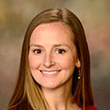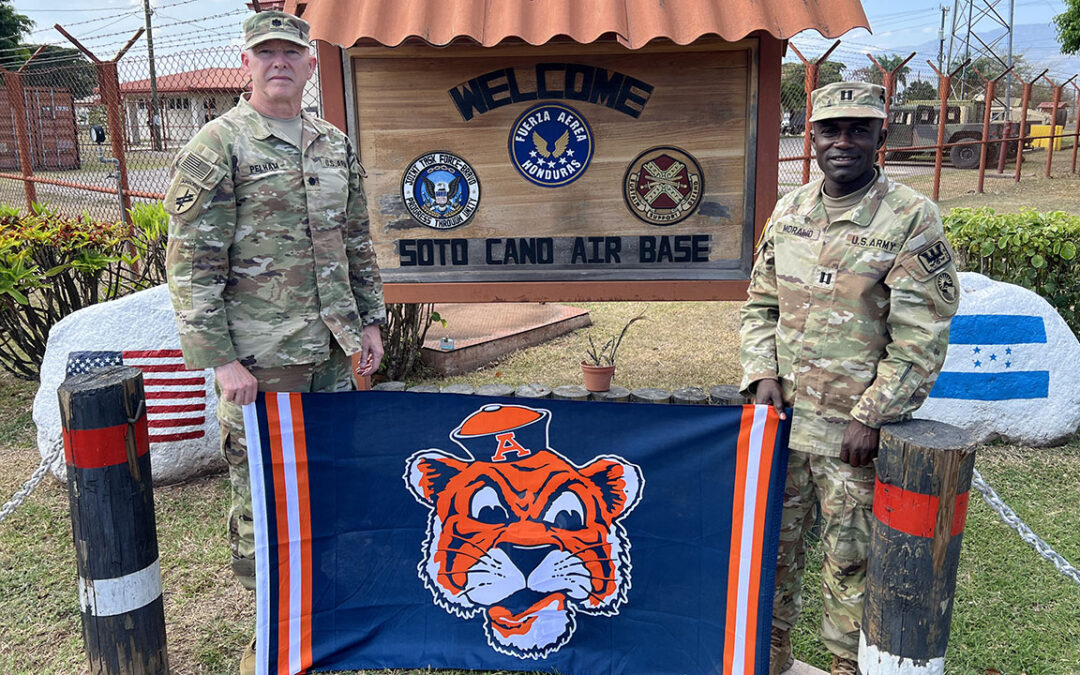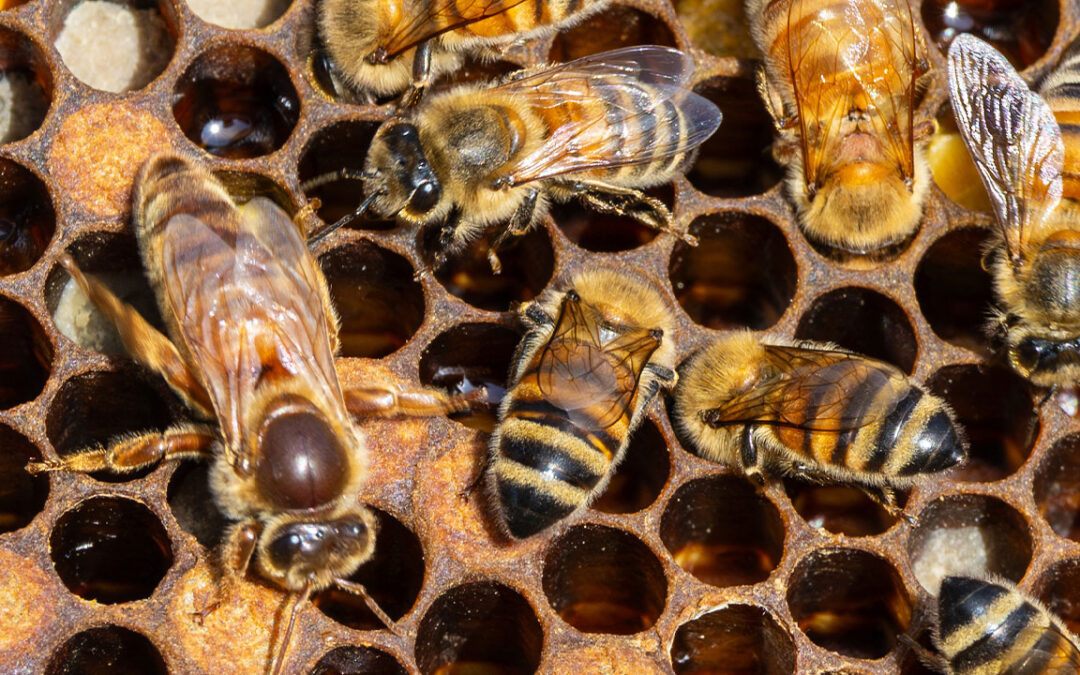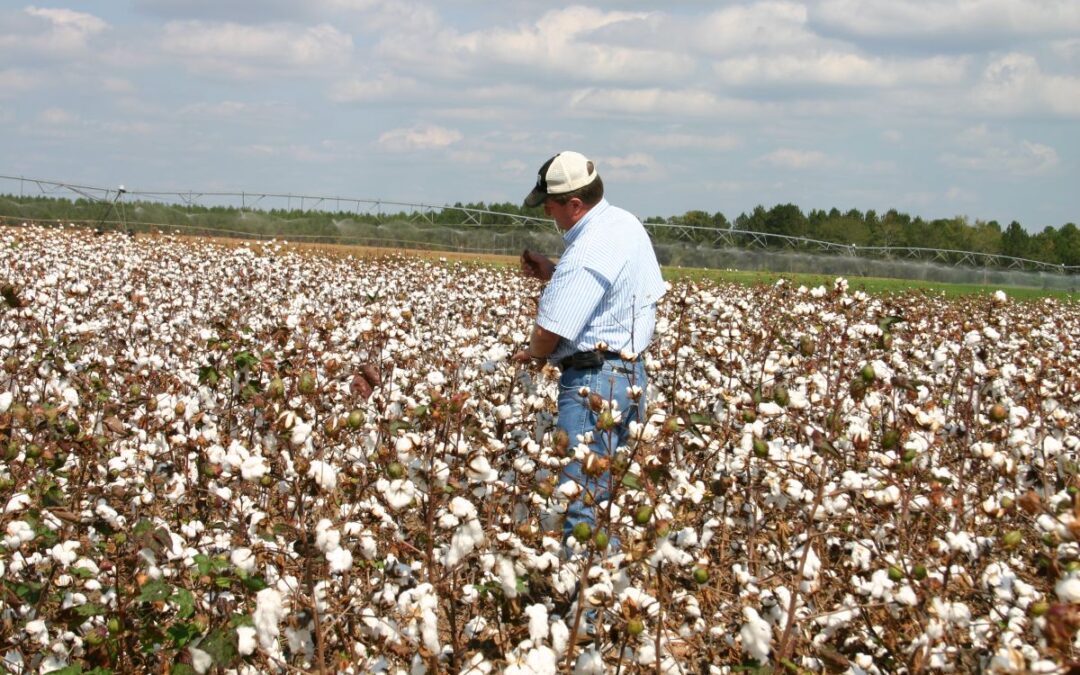Office’s mission: raising global awareness in College of Ag
by JAMIE CREAMER

Visiting scholars from China, Egypt, Brazil and India attended a first-of-its-kind luncheon hosted in March by the Global Programs Office.
It was a simple PowerPoint slide welcoming Juliana Lima to the College of Agriculture at Auburn University as a visiting scholar.
But when Lima, a Brazilian professor of aquaculture engineering who’s at Auburn through April to collaborate with College of Agriculture rural sociology professor Conner Bailey on a project, saw her picture and the personalized greeting flash up on the flat-screen monitor in Comer Hall’s lobby, it made her day.
And that’s what the small gesture was intended to do, says the College of Agriculture’s Henry Fadamiro.
“One of our top priorities in this office is to enhance the Auburn University experience for all of our visiting scholars and international students by recognizing them, engaging them in the college and being a resource for them,” he says.
Fadamiro, an alumni professor of entomology, was named assistant dean and director of the Office of Global Programs for the college in September, and in the six months since, he and global programs support specialist Elizabeth Scarborough have made definite progress on that front. In a first-of-its-kind event in March, for instance, Fadamiro and Scarborough invited all current visiting faculty in the college to a luncheon, and 11 of them—representing China, Egypt, Brazil and India—accepted the invitation.
“The luncheon was a time for us to meet all of them and for them to network with each other,” Scarborough says. “They all had the chance to introduce themselves to the rest of the scholars and tell where they’re from, what research they’re working on while they’re at Auburn and which of our professors they’re working with.
“It also gave them the opportunity to ask us any questions they might have, about anything about the university, the Auburn area or any human resource issues,” she says. “It went so well that we’ll be hosting a visiting scholars’ lunch every fall and spring semester.”
Later this spring, the office also will bring all graduate and undergraduate international students enrolled in the college together for a picnic. Odds are, that will become a recurring event, too, and one that grows every year, given the Office of Global Programs’ commitment to step up the active recruitment of outstanding students from outside the U.S. to Auburn’s College of Agriculture.
“It’s called ‘internationalization,’ and it is especially important in agriculture, because no field is as global as agriculture,” Fadamiro says. “Our office is focused on increasing global consciousness throughout the college.”
Study tours abroad, of course, are excellent means of broadening the worldview of students in the college, and energizing that program is another of Fadamiro’s highest priorities. It also promises to be one of his biggest challenges, because, although the College of Agriculture has been offering study abroad opportunities for many years, student buy-in has been minimal.
2015 is a classic case in point. For this calendar year, College of Agriculture faculty had proposed—and the Office of Global Programs had widely promoted—15 fascinating study abroad tours, ranging from an agricultural and cultural tour of Turkey to a tour focused on the tropical agro-ecosystems of Belize. But despite the desirable destinations, the beyond-the-classroom educational experiences, the intriguing itineraries and the availability of scholarships to cover most of the costs, at least two-thirds of those trips have been canceled, due to a total lack of student interest.
Fadamiro says that fewer than 5 percent of students in the college participate in overseas tours each year. Compare that to the more than 25 percent of University of Georgia agriculture students who annually study abroad.
“We are trying to understand why this is the case and looking at all possible ways to improve these numbers,” says Fadamiro. “Studying abroad is a once-in-a-lifetime opportunity for many of these students, and we must help them realize that.”
Fadamiro knows personally how life-changing an international experience can be. The native Nigerian was awarded his B.S. and M.S. degrees in biology from the Federal University of Technology Akure in his home country and was working as an assistant lecturer there when, in 1992, he was awarded the opportunity to pursue his doctorate in biology, entomology and pest management at the University of Oxford as a Rhodes scholar.
The three years he spent in the United Kingdom, he says, were transformative.
“The experience of living in another country and learning to appreciate another culture changed and shaped my view of the entire world,” he says.
It also expanded the borders of his comfort zone, so much so that, instead of returning to Nigeria after receiving the Ph.D. from Oxford in 1995, he moved his family to the U.S., where he worked as a postdoctoral researcher at Iowa State University for two years and at the University of Minnesota for another. He came to Auburn in 2003 from a position as a research entomologist with the Minnesota Department of Agriculture.
“I have a truly international family,” Fadamiro says. “My oldest son was born in Nigeria, the youngest was born in the United Kingdom, and my daughter was born in Minnesota.”
When the position as director of the college’s revamped global programs was first announced, Fadamiro had little interest—primarily because of his passion, first, for his entomological research and, second, for his teaching responsibilities—but several of his colleagues convinced him to apply, which he did at the last possible moment.
“I suppose some could think I was a good fit for the job because I was born outside the United States,” he says. “But you don’t have to be born in another country to have a global view. The key is, you must have an appreciation for other cultures.”




